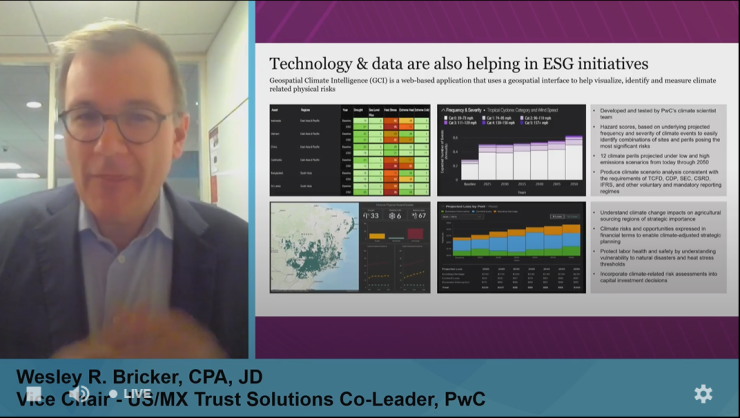The International Sustainability Standards Board is providing information to companies to help them adopt its sustainability and climate disclosure standards before they take effect in January.
The new resources include enhancements to the standards it inherited from the Sustainability Accounting Standards Board after
The International Financial Reporting Standards Foundation, which oversees both the ISSB and the International Accounting Standards Board published
The material includes three examples to illustrate how companies might approach these aspects of their climate-related disclosures. The publication follows the launch of the
At a board meeting Thursday in Frankfurt, Germany, the ISSB agreed on updates to the SASB standards. following public consultation and deliberations on feedback from the marketplace. During the board meeting, the ISSB also discussed the planned next steps for the taxonomy, which is intended to be published in the first half of 2024.
The targeted updates enhance the international applicability of the SASB standards, which are a source of guidance for companies applying
IFRS S1 requires companies to disclose material information on all sustainability-related risks and opportunities that could reasonably be expected to affect their prospects. IFRS S2 sets out the requirements for climate-related disclosures. For risks and opportunities beyond climate, IFRS S1 directs companies to sources of guidance and requires companies to refer to and consider the industry-based SASB standards. The updated SASB standards will be available next week.
Separately, the AICPA & CIMA hosted an online ESG and sustainability conference Thursday in which Wes Bricker, vice chair and U.S. Trust Solutions co-leader at PwC and a former chief accountant at the Securities and Exchange Commission, discussed the ISSB standards and the proposed climate-related disclosure rule from the SEC, as well as the European Union's Corporate Sustainability Reporting Directive.
"The ISSB standards and the SEC's disclosure requirements are complementary, but they're different," said Bricker. "The main purpose is to inform investors. It's important to keep those distinctions in mind because frameworks can be designed for slightly different purposes. Those are overlapping and in many cases complementary, but in understanding the primary purpose it helps to bring out the context for what the reporting requirements are intending to achieve and materiality judgments that are needed in order to comply with the purpose and the spirit of the requirements and ultimately, to be successful in reducing the cost and the burden of at times fragmented requirements."
He noted that the EU's CSRD has concepts of double materiality, which consists of financial materiality as well as impact materiality. "The ISSB and SEC focus on materiality in relation to investors and so they can require a reconciliation process," Bricker added. "The IFRS Foundation describes the intention of the ISSB standards to really deliver a comprehensive global baseline of sustainability-related disclosure standards that provide investors and other capital market participants with the information that a company's sustainability-related risks and opportunities present in order to help them make more informed decisions."
Bricker spoke a day after the conclusion of the United Nations' COP28 climate change conference in Dubai, which for the first time committed to a phase-out of fossil fuels to net zero emissions by 2050. He was asked by Accounting Today about the impact of the standards in light of those developments.
"This is why it needs to be high on everyone's agenda," said Bricker. "An agreement of that nature over a lengthy time period to 2050 to phase out fossil fuels impacts business strategy, the risks that we face, the risks that are transmitted into a company, physical risks, as well as the impact of the company on the environment, and transition. Many of the disclosure requirements, even the SEC baseline requirements today, require a disclosure of risks, business outlook, uncertainties, liquidity and capital resources, as well as financial performance, so there's something here for everybody this cycle."

The ISSB said Thursday it's continuing to discuss feedback on its consultation on future priorities with a view to finalizing its two-year work plan in the first half of 2024. Included in these discussions is consideration of how the SASB standards can be enhanced and built upon.
The ISSB also said it remains focused on supporting and driving adoption of the ISSB Standards throughout 2024. As part of this work, the ISSB said it's continuing to prioritize discussions about interoperability, including with jurisdictional and voluntary initiatives focused on stakeholders beyond investors, and will continue to coordinate its work with its sister board, the International Accounting Standards Board.
The first joint technical meeting of the ISSB and the IASB will take place in January when the boards will discuss the feedback received in response to the ISSB's agenda consultation about a potential project for further integration in reporting.
The





